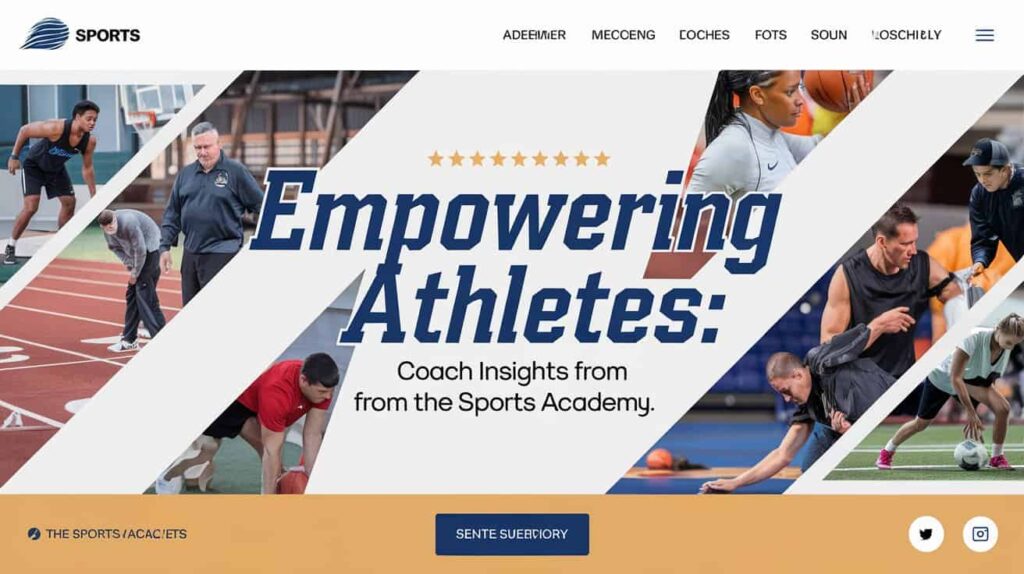Empowering Athletes: Coach Insights from the Sports Academy
When it comes to the world of sports, the role of a coach is nothing short of pivotal. In Chile, where sports have a passionate following and a rich culture, coaches are more than just mentors; they are the backbone of athlete development. This article dives deep into what makes an exceptional coach in Chilean sports, the journey to becoming a certified coach, the skills athletes need to thrive, and how sports academies are transforming the landscape of athletic performance.
What Makes a Great Coach in Chilean Sports?
Key Qualities of Successful Coaches
A great coach in Chilean sports embodies a mix of technical knowledge, emotional intelligence, and a deep-seated passion for the game. These qualities are critical as they not only enhance the athletic performance of their athletes but also foster a positive environment that encourages resilience and discipline. Coaches must be able to capture the essence of their sport, whether it’s soccer, tennis, or any other discipline, and communicate it effectively to their team. The head coach is often seen as the leader, but it’s important to note that assistant coaches play a vital role too, helping to implement strategies and support athletes on a more personal level. Together, they create a dynamic coaching team that can inspire and guide athletes toward their goals.
The Role of Passion in Coaching
Passion is a game changer in coaching. In Chile, where sports are woven into the fabric of society, a coach’s enthusiasm can be contagious, igniting a similar passion in their athletes. This commitment goes beyond merely teaching skills; it involves fostering an environment where athletes feel empowered to pursue their dreams of high performance. Passionate coaches motivate their athletes to push boundaries, whether they are training for a national championship or simply pursuing a personal best. This love for the sport helps athletes tap into their potential and strive for high performance, making their journey more fulfilling and enjoyable.
How Coaches Foster Athlete Development
Coaches play a crucial role in the holistic development of athletes. They not only focus on the technical skills required to excel in their sport but also emphasize the importance of academic education alongside athletic training. In Chile, many coaches integrate educational components into their training regimens, guiding athletes to balance their academic responsibilities while pursuing their sports. This dual approach ensures that athletes develop into well-rounded individuals who can thrive both in the arena and in life beyond sports. Additionally, coaches help athletes develop essential life skills such as teamwork, communication, and leadership, which are invaluable regardless of the path they choose.
How to Become a Certified Coach in Chile?
Steps to Achieve Coaching Certification
For those looking to step into the role of a coach in Chile, obtaining a coaching certification is a significant first step. The process typically involves completing an accredited coaching program that emphasizes both theoretical knowledge and practical experience. Many aspiring coaches start by enrolling in courses offered by universities or sports academies. These programs often combine lectures on sports science, psychology, and pedagogy with hands-on coaching experiences, allowing future coaches to learn alongside seasoned professionals. Once the coursework is completed, candidates may need to pass an examination to obtain their official coaching certification.
Understanding the Importance of Certification
Certification is crucial for several reasons. First, it lends credibility to the coach, demonstrating their commitment to the profession and their ability to foster athlete development effectively. In Chile, certified coaches are often preferred by clubs and academies when hiring for positions, as they have undergone rigorous training and assessment. Moreover, certification programs often emphasize the latest coaching methodologies, ensuring that coaches are up-to-date with contemporary practices that can maximize athletic performance in the USA. This commitment to continuous learning is vital in the ever-evolving world of sports.
Available Coaching Programs in Chile
Chile boasts a variety of coaching programs tailored to different sports and levels of expertise. From specialized training for a tennis coach to broader programs for youth sports, there’s something for everyone. Institutions like Universidad de Chile offer comprehensive coaching courses that cover everything from technical skills to nutrition and recovery strategies. These programs are designed not only to teach aspiring coaches how to develop elite athletes but also to instill values of dedication and commitment that are essential for long-term success in sports.
What Skills Do Athletes Need to Succeed?
Essential Skills for Different Sports
Success in sports is not solely about natural talent; it also requires the development of specific skills tailored to each sport. For example, endurance and agility are crucial for athletes competing in soccer or track and field, while technical skills and strategic thinking are vital for those in sports like tennis or swimming. Coaches in Chile focus on assessing the skill sets of their athletes and designing training programs that target their unique needs. By emphasizing these essential skills, coaches help athletes maximize their potential and prepare for competitions at various levels.
How Coaches Help Athletes Develop Skills
Coaches are instrumental in helping athletes develop the skills they need to succeed. They provide guidance, feedback, and structured training that allows athletes to practice and refine their abilities. In Chile, many coaches employ a variety of training techniques, including drills, simulations, and competitive scenarios, to create an engaging learning environment that fosters high performance. This hands-on approach not only helps athletes improve their technical skills but also builds their confidence and mental resilience, which are equally important in high-pressure situations like championships.
The Importance of Mental Skills in Sports
Mental skills are often the unsung heroes of athletic success. Coaches in Chile understand that developing mental toughness, focus, and strategic thinking is just as important as physical training. They often integrate mental conditioning exercises into their practices, teaching athletes techniques to manage pressure and maintain composure during competitions. By fostering these mental skills, coaches empower athletes to perform at their best when it matters most, whether they are racing for a national title in the USA or competing in a local match.


Shock Absorber Sports Bra: Is Ultimate Support for Women in 2024?

Nike Sports Bra: Ultimate Comfort & Support for Every Workout 2024

How Do Coaches Prepare Athletes for Championships?
Training Regimens Leading Up to Competitions
Preparing athletes for championships is a multi-faceted process that requires careful planning and execution to ensure high performance. Coaches develop detailed training regimens that gradually build intensity and incorporate various aspects of athletic performance, including strength, endurance, and skill refinement. In the lead-up to a championship, training may become more focused, with coaches emphasizing tactical preparation and competition simulation. This structured approach ensures that athletes are physically and mentally ready to face their opponents, maximizing their chances of success.
Strategies for Building Team Cohesion
Team cohesion is vital for success in many sports, and coaches play a key role in fostering this unity. In Chile, coaches implement various team-building strategies, such as group activities, communication exercises, and even social outings, to strengthen relationships among athletes. By creating a supportive environment, coaches help athletes feel more connected, which can enhance their performance on the field or court. This sense of camaraderie is especially important during high-pressure situations like championships, where teamwork can make all the difference.
Nutrition and Recovery Plans for Peak Performance
Nutrition and recovery are critical components of an athlete’s training plan, and coaches in Chile are increasingly emphasizing their importance. They work closely with nutritionists to develop meal plans that fuel athletes for peak performance while also promoting recovery. Additionally, coaches educate their athletes on the significance of rest and recovery practices, ensuring they understand how to listen to their bodies and avoid burnout. By prioritizing these aspects, coaches help athletes maintain their physical health, enhance their endurance, and achieve high performance during competitions.
What Is the Impact of Sports Academies on Athlete Development?
How Academies Shape Future Athletes
Sports academies in Chile are transforming the landscape of athlete development. By providing structured training programs, access to top-notch facilities, and expert coaching, these academies play a pivotal role in shaping the next generation of athletes. Many aspiring athletes enroll in academies to gain specialized training, mentorship, and opportunities to compete at higher levels. The environment fosters not only skills development but also personal growth, as athletes learn discipline, commitment, and teamwork alongside their training.
Success Stories from Chilean Sports Academies
There are countless success stories emerging from Chilean sports academies, showcasing the impact of dedicated coaching and rigorous training. Many athletes who have risen to elite levels in their sport credit their development to the guidance they received at these academies. From soccer stars who have made it to professional leagues to tennis champions who have competed internationally, the success of these athletes serves as inspiration for young talent in Chile. These stories highlight the importance of investing in quality coaching and training programs to nurture future champions.
The Role of Academies in Promoting Sports in Chile
Sports academies also play a crucial role in promoting sports culture in Chile. By providing a structured environment for training and competition, they encourage young athletes to pursue their passion for sports. These academies often collaborate with schools and communities, emphasizing the importance of integrating education and sports. This holistic approach not only helps athletes develop their skills but also fosters a love for sports that can last a lifetime. As a result, sports academies contribute to a vibrant sports culture in Chile, inspiring more youth to engage in athletic pursuits.
Conclusion
To wrap things up, it’s pretty clear that Chile’s cycling scene, especially in Santiago, has been on fire in recent years. With Leonardo leading the charge as a founder of high-performance teams, they’ve shown the world what they’re made of. It’s a real testament to the capability of these young riders who are proving they can compete professionally on an international stage like the UCI.
And honestly, it’s just so rewarding to see the high performance of athletes. youngest talents master their skills and seamlessly rise to the occasion. The journey ahead looks bright for Chilean cycling, and I can’t wait to see what they accomplish next!

FAQs
Q: What is the main goal of the Sports Academy’s programs for athletes and coaches?
A: The main goal is to empower athletes and coaches by providing high-performance training and development programs that focus on enhancing technical ability and mindset.
Q: How does the Sports Academy help athletes qualify for national tournaments?
A: The academy offers tailored training programs that focus on skill development, physical conditioning, and competition strategies, which are designed to help athletes qualify for national tournaments efficiently.
Q: Are there opportunities for both boys and girls at the Sports Academy?
A: Absolutely! The Sports Academy is committed to the development of players regardless of gender, offering inclusive programs for both boys and girls.
Q: Who founded the Sports Academy, and what was their vision?
A: The Sports Academy was founded in 2020 by a former state champion with a profound passion for sports. Their vision was to create a space where young athletes could train at a high level and improve their skills.
Q: What types of sports programs does the academy offer?
A: The Sports Academy offers a variety of sports programs, including clinics, summer camps, and personal training sessions that focus on different sports and skill levels.
Q: Can you tell me more about the coaching staff at the Sports Academy?
A: The coaching staff includes experienced professionals who have served as head coaches at various levels, including varsity and junior divisions, and have a wealth of experience and knowledge to share with the athletes.
Q: Is the Sports Academy involved with any teams in Chile or Ecuador?
A: Yes, the academy has partnerships with teams like Colo-Colo in Chile and also collaborates with clubs in Ecuador, providing athletes with exposure to high-level training and competition.
Q: What kind of achievements have athletes from the Sports Academy accomplished?
A: Athletes from the Sports Academy have gone on to become all-time leading scorers in their divisions and have participated in national tournaments, showcasing their skills and hard work.
Q: How do summer camps at the Sports Academy differ from regular training?
A: Summer camps at the Sports Academy provide an intensive training experience that combines skill development with fun activities, allowing athletes to train with peers and improve their game in a more relaxed setting.
Q: What is the importance of mindset in athlete development at the Academy?
A: Mindset is crucial in athlete development as it influences performance, resilience, and the ability to overcome challenges. The Sports Academy emphasizes mental training alongside physical skills to ensure holistic development.

Skip the Games Grand Rapids: Find Personal Encounters on TikTok App

Grant Maxwell High School Sports Journey: Football & Baseball Highlights







